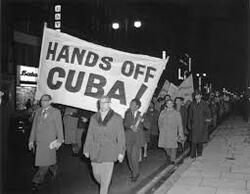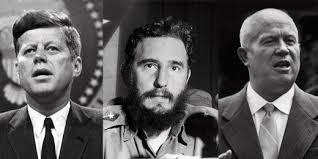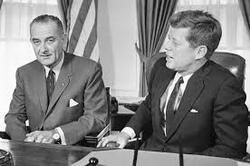
The Cuban Missile Crisis defined Kennedy’s presidency in just the couple of weeks over which it occurred. The 1960 election was dominated by foreign policies as Americans prepared for a seemingly inevitable clash with the Soviet Union. Much of Kennedy’s campaign was built around his cold-warrior image, and in the thirteen-day climax in our conflict with Russia and Cuba, Kennedy’s campaign promises got put through the wringer. Kennedy and his administration navigated arguably the most intense thirteen days in human history successfully due to their unwavering commitment to the protection of the Western Hemisphere.

On October 16th, 1962, Kennedy claimed to have first discovered Soviet missile sites in Cuba. Faced with an unimaginable task, the president engaged in two weeks of negotiations that could be the difference between a potentially global Nuclear engagement, and the peaceful removal of missiles from Cuba.
On October 22nd, Kennedy addressed the American people about the Cuban Missile Crisis. He calls Cuba an “imprisoned island”, presumably imprisoned by its communist dictator Fidel Castro, along with the newfound presence of the Soviet Union. His address was firm and elegant as he laid down the law. He placed a blockade around Cuba, which did not resonate well with the Soviet Union, and in turn, it freaked Americans out a little bit. An article from The Lawton Constitution headlined, “Russia says blockade-’Steps To Nuclear War’”(Steps To).
In an excerpt from his speech he stated, “The 1930's taught us a clear lesson: aggressive conduct, if allowed to go unchecked and unchallenged, ultimately leads to war. This nation is opposed to war. We are also true to our word. Our unswerving objective, therefore, must be to prevent the use of these missiles against this or any other country, and to secure their withdrawal or elimination from the Western Hemisphere”(October 22). He does not ask, he does not plead, he offered an ultimatum. That is a bold move from a guy with his track record, but he is the cold warrior that Americans voted into power. An article written by The New York Times has the headline, “He said Cuba had been turned into an offensive base capable of rocket destruction into the heart of America”(Ultimatum to). Despite all of this hard talk, Kennedy in the very same speech refers to his policies as follows, “Our policy has been one of patience and restraint, as befits a peaceful and powerful nation, which leads a worldwide alliance”(October 22). He has placed himself and the United States on a moral pedestal.
With Capitalist and Communist alike tuned into Kennedy’s every word, he was direct. In a letter from Kennedy to Khrushchev, JFK writes, “the cessation of work on missile sites in Cuba and measures to render such weapons inoperable, under effective international guarantees. The continuation of this threat, or a prolonging of this discussion concerning Cuba by linking these problems to the broader questions of European and world security, would surely lead to an intensified situation on the Cuban crisis and a grave risk to the peace of the world. For this reason I hope we can quickly agree along the lines outlined in this letter and in your letter of October 26th” (October 27). Kennedy's message is heard loud and clear, Khrushchev promptly responds with a rather bitter letter in which he both seconds the president's concerns and criticizes Kennedy on the violations of international law that he had committed. Specifically, the letter chastised the president about U.S. planes entering foreign air space.
On October 22nd, Kennedy addressed the American people about the Cuban Missile Crisis. He calls Cuba an “imprisoned island”, presumably imprisoned by its communist dictator Fidel Castro, along with the newfound presence of the Soviet Union. His address was firm and elegant as he laid down the law. He placed a blockade around Cuba, which did not resonate well with the Soviet Union, and in turn, it freaked Americans out a little bit. An article from The Lawton Constitution headlined, “Russia says blockade-’Steps To Nuclear War’”(Steps To).
In an excerpt from his speech he stated, “The 1930's taught us a clear lesson: aggressive conduct, if allowed to go unchecked and unchallenged, ultimately leads to war. This nation is opposed to war. We are also true to our word. Our unswerving objective, therefore, must be to prevent the use of these missiles against this or any other country, and to secure their withdrawal or elimination from the Western Hemisphere”(October 22). He does not ask, he does not plead, he offered an ultimatum. That is a bold move from a guy with his track record, but he is the cold warrior that Americans voted into power. An article written by The New York Times has the headline, “He said Cuba had been turned into an offensive base capable of rocket destruction into the heart of America”(Ultimatum to). Despite all of this hard talk, Kennedy in the very same speech refers to his policies as follows, “Our policy has been one of patience and restraint, as befits a peaceful and powerful nation, which leads a worldwide alliance”(October 22). He has placed himself and the United States on a moral pedestal.
With Capitalist and Communist alike tuned into Kennedy’s every word, he was direct. In a letter from Kennedy to Khrushchev, JFK writes, “the cessation of work on missile sites in Cuba and measures to render such weapons inoperable, under effective international guarantees. The continuation of this threat, or a prolonging of this discussion concerning Cuba by linking these problems to the broader questions of European and world security, would surely lead to an intensified situation on the Cuban crisis and a grave risk to the peace of the world. For this reason I hope we can quickly agree along the lines outlined in this letter and in your letter of October 26th” (October 27). Kennedy's message is heard loud and clear, Khrushchev promptly responds with a rather bitter letter in which he both seconds the president's concerns and criticizes Kennedy on the violations of international law that he had committed. Specifically, the letter chastised the president about U.S. planes entering foreign air space.

As the two leaders begin exchanging letters at a more rapid rate, they seem to have found some common ground in the well being of their nations. Kennedy replies to Khrushchev’s broadcast as follows, “I am replying at once to your broadcast message of October 28, even though the official text has not yet reached me, because of the great importance I attach to moving forward promptly to the settlement of the Cuban crisis. I think that you and I, with our heavy responsiblities for the maintaining of peace, were aware could have become unmanageable. So I welcome this message and consider it an important contribution to peace.” Those are words that Kennedy is very blessed to be able to write, in the face of mutual destruction, the two superpowers came to a settlement and the Western Hemisphere has the Kennedy administration to thank for it. And the American people know this as well, newspaper articles exclaimed, “Khrushchev Offers to Scrap Cuba Bases- Kennedy calls ‘Statesmanlike Decision’ Aid To Peace”(Khrushchev Offers).
What does that mean to make a “Statesmanlike Decision”? It is the icing on top of the cake, he places Americans back on a pedestal by complimenting the Soviet Union by saying it was a decision that Americans would have made, it was Statesmanlike.
In the face extreme adversity, the Kennedy Administration delivered on its promise to stand tall in the face of communism. Kennedy made an extraordinary effort to provide peace and security to the United States, and on October 28th, Khrushchev announced the removal of Soviet Union missiles from Cuba, and the 1962 Cuban Missile Crisis had come to an end.
Work Cited:
Primaries:
-Kennedy, John F. "October 22nd Cuban Missile Crisis Address." 22 Oct. 1962.
Speech.
---. "October 28 Letter From Kennedy to Khrushchev." 28 Oct. 1962. Reading.
---. "October 27 Kennedy to Khrushchev." 27 Oct. 1962. Reading.
Secondaries:
-"Khrushchev Offers to Scrap Cuba Bases- Kennedy calls 'Statesmanlike Decision'
Aid To Peace." Herald Tribune [New York City], 1962.
-"Steps To Nuclear Warfare." The lawton Constitution, 1962.
-"Ultimatum to Khrushchev 'MOVE THOSE MISSILES.'" The New York Times [New York
City], 23 Oct. 1962.
What does that mean to make a “Statesmanlike Decision”? It is the icing on top of the cake, he places Americans back on a pedestal by complimenting the Soviet Union by saying it was a decision that Americans would have made, it was Statesmanlike.
In the face extreme adversity, the Kennedy Administration delivered on its promise to stand tall in the face of communism. Kennedy made an extraordinary effort to provide peace and security to the United States, and on October 28th, Khrushchev announced the removal of Soviet Union missiles from Cuba, and the 1962 Cuban Missile Crisis had come to an end.
Work Cited:
Primaries:
-Kennedy, John F. "October 22nd Cuban Missile Crisis Address." 22 Oct. 1962.
Speech.
---. "October 28 Letter From Kennedy to Khrushchev." 28 Oct. 1962. Reading.
---. "October 27 Kennedy to Khrushchev." 27 Oct. 1962. Reading.
Secondaries:
-"Khrushchev Offers to Scrap Cuba Bases- Kennedy calls 'Statesmanlike Decision'
Aid To Peace." Herald Tribune [New York City], 1962.
-"Steps To Nuclear Warfare." The lawton Constitution, 1962.
-"Ultimatum to Khrushchev 'MOVE THOSE MISSILES.'" The New York Times [New York
City], 23 Oct. 1962.
